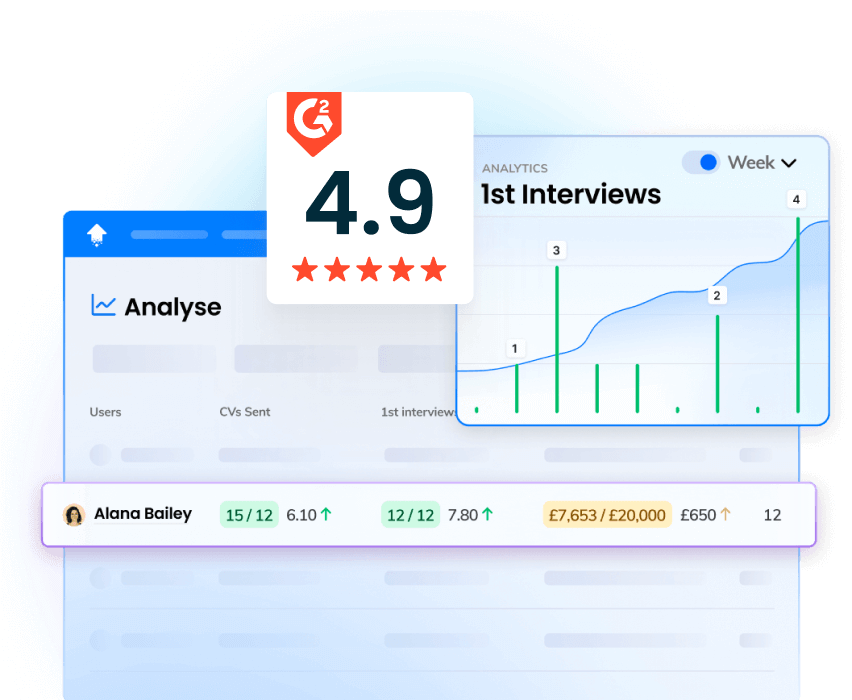It’s not easy out there for recruitment leaders in 2024.
Recruitment leaders must navigate their team through an uncertain business landscape that has undergone massive shifts in the past few years.
While the UK’s labour market remains historically tight, demand for workers is expected to soften further against the backdrop of recession in the coming months, according to Indeed research.
Meanwhile, candidates have become more confident in demanding a strong work-life balance and flexibility from employers in the post-pandemic era.
These challenging conditions mean recruiters have never needed strong team leaders more.
Read on to find out how to help your agency adapt and thrive in today’s tricky recruitment landscape with ten recruiting tips.
10 Advanced Tips for Recruitment Leadership
From data insights to learning and development, cutting-edge tech is changing all aspects of recruitment agency life.
Here are ten top recruitment tips for harnessing this technology for success.
1. Make data-driven strategic decisions
In 2024, strong recruitment leaders are making strategic decisions based on accurate, relevant, real-time data.
Once upon a time, we only had gut instinct to go on.
Sometimes our hunches would pay off — but often they wouldn’t.
And that could lead to some pretty awkward conversations with stakeholders.
Which brings us to the first of our recruitment agency tips.
In the information age, with huge amounts of data at your fingertips, and powerful AI tools poised to perform analysis, relying only on gut instinct will set you back.
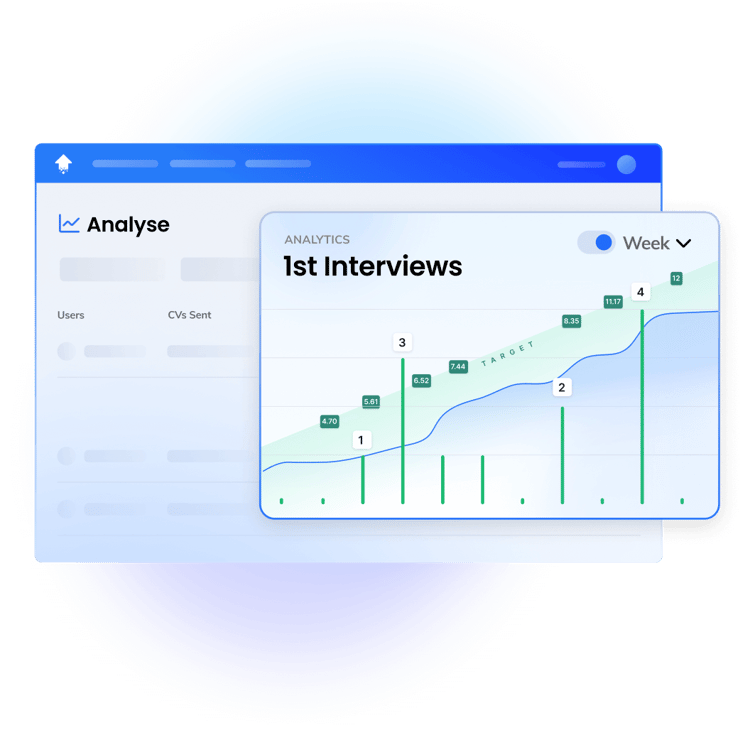
Instead, empower your team with transparent real-time data and powerful analytics tools.
This is key to developing successful recruitment strategies, understanding and optimising your performance.
At the touch of a button, you can find out how your team is performing, investigate any leaks or blocks in your recruitment funnel, and identify key market trends.
You can delve deeper into the data too — for example you could test how successful your latest job ad was, or find out which hiring managers are the most picky about their candidates.
Through this analysis, you can then go on to make data-backed decisions that will benefit your agency.
What’s more, with solid data stored in one centralised system, forecasting is easier and more accurate than ever.
2. Empower your reps to self-manage
Focus your reps on outcomes, not activities.
With clear and transparent data insights available at the touch of a button, it’s now super easy to track how recruiters are performing.
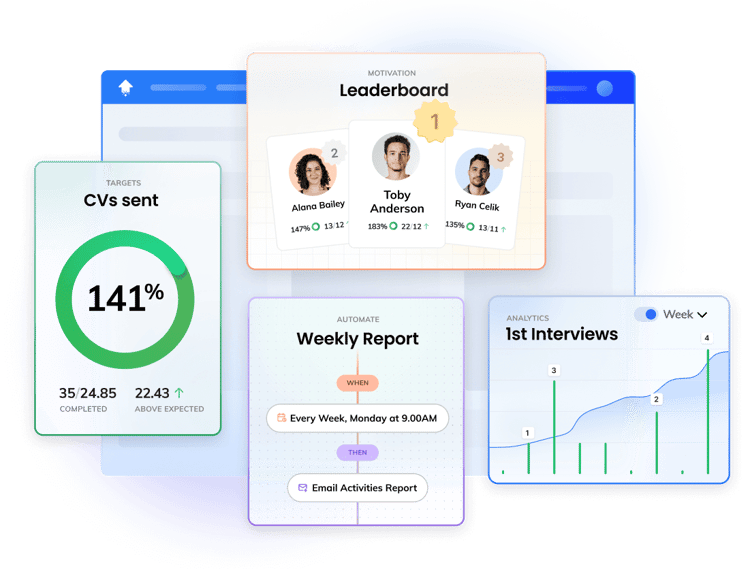
This means you can zoom in on the important stuff — aka their results — rather than the actions they’re taking to get those results.
Why is this one of our top tips for recruiting?
Sure, making more BD calls may roughly correlate with bringing in more business, and sourcing more candidates may push up the quality of the hiring pool.
But if you’re simply setting task-driven goals such as ‘make ten BD calls every week’ or ‘source 30 candidates for this vacancy’, there’s no focus on quality.
All your rep has to do to hit your goals is simply make those calls or source those candidates — even if the BD leads are a long shot or they know those candidates aren’t the best fit for the role.
Simply put — it may look like they’re doing a great job when their actual performance is pretty weak.
So what happens if you switch up your goals to ‘bring in £X revenue this month’ or ‘place a candidate in this vacancy who stays in the role for at least one year’?
Now you’re putting the focus on the stuff you really need from your reps if your agency is to thrive.
The quality.
Sure, they might make fewer BD calls, or source fewer candidates.
But they will focus much more on the quality of those calls and ensure they are sourcing the right candidates for the right roles in order to hit their goals — and bag their incentives.
It significantly improves both the hiring manager and candidate experience.
This makes self-management one of the most important business development tips for recruiters.
What’s more, if you’re still focusing on tasks rather than outcomes, your recruiting process becomes rigid and your strategy stale.
By shining a spotlight on outcomes, you can adjust and adapt your actions when your strategy falters.
For example, if you’re tracking the amount of monthly revenue one rep is bringing in and notice it drop sharply — you’re going to need to investigate the problem.
If you’re keeping a close eye on successful placements, and see that a growing percentage of hires are leaving the company quickly, you’ll want to find out why and fix the issue at its source.
But if you’re only looking at the number of BD calls made or candidates sourced, it will take much longer for you to notice the problem, never mind rectify it.
So set your reps outcome-based goals and empower them to track their own progress towards hitting these targets with custom dashboards.
This enables them to self-manage their own performance — freeing up your time while focusing them on what really matters.
3. Provide visibility across your org
Many agencies struggle with a lack of data transparency.
Why?
Old, complex systems that only permit a few users, a lack of confidence in the accuracy of that data, a lack of confidence in recruiters’ own data analytics skills — to name a few.
Perhaps even an attempt to spare the feelings of employees with low performance?
Whatever the reason, it’s time to stop gatekeeping your data.
Transparent data can work wonders for any team.
With their performance laid out in black and white, recruiters should be spurred on to hit their goals and receive their incentives.
Essentially they will self-manage and motivate while heading in the direction you want and need them to.
Furthermore, it empowers reps to make data-driven strategic decisions — much more effective than guesswork.
And with more eyes on the data, your team is much more likely to spot and rectify issues throughout their workflows and their hiring process.
In 2024, there are now a wide range of data analytics tools that use AI to deliver key insights in a clear, visual manner.
So while you may want to provide some training for your team on how best to harness these tools, they do not need to be data scientists to properly capitalise on this data.
And with these modern recruitment tools, real-time data from across your tech stack is centralised and consolidated via automation.
Before installing such software, you may want to conduct an auditing exercise to ensure your existing data is accurate, consistent, and relevant.
Finally, you’ll have confidence in the integrity of your data — and be happy to share it.
4. Take a data driven approach to one-to-ones
This is one of the most important agency recruiting tips.
If you want your recruiters to take data seriously, you need to bake it into the DNA of your business.
This means taking a data-driven approach to one-to-ones.
There’s little point giving reps data-driven goals and urging them to check their custom dashboards every day if you’re not reinforcing this within personal development meetings.
While you want your reps to self-manage, they also want to know that leaders are keeping an eye on their performance.
This is where OneUp comes in.
Using this recruiting analytics software, you can set SMART goals and track progress towards these targets with beautiful, easy-to-understand visualisations.
Create a custom dashboard for each rep on OneUp — and give them access so they can check it at any time.
Make these dashboards a focal point of your one-to-ones, to demonstrate that your feedback is not simply ‘gut feeling’, but is backed by cold hard data.
Take a deep dive into why each custom dashboard looks how it does.
For example, the data may show the impact of new tactics that have resulted in an increase in placements and revenue.
Or conversely, it could explain why many applicants have suddenly started to drop out of the candidate journey.
Where things are going well, acknowledge and reward this performance, and where data highlights a problem, discuss strategies for tackling this and follow up in your next one-to-one.
After all, acknowledging strong performance — clearly backed up by data — in one-to-ones is also key for motivating your team.
As well as reinforcing data-led company culture and helping to manage performance, this approach ensures the one-to-ones themselves are as productive as possible.
5. Automate the busy work and focus your time on empowering your team
How many days in your recruitment career have you spent on tedious, repetitive tasks?
Too many?
For years, administrative tasks have been a necessary evil in recruitment.
Time consuming and boring, but key to the smooth running of operations.
No longer.
With automation on your team, you can free yourself and your team from this busywork.
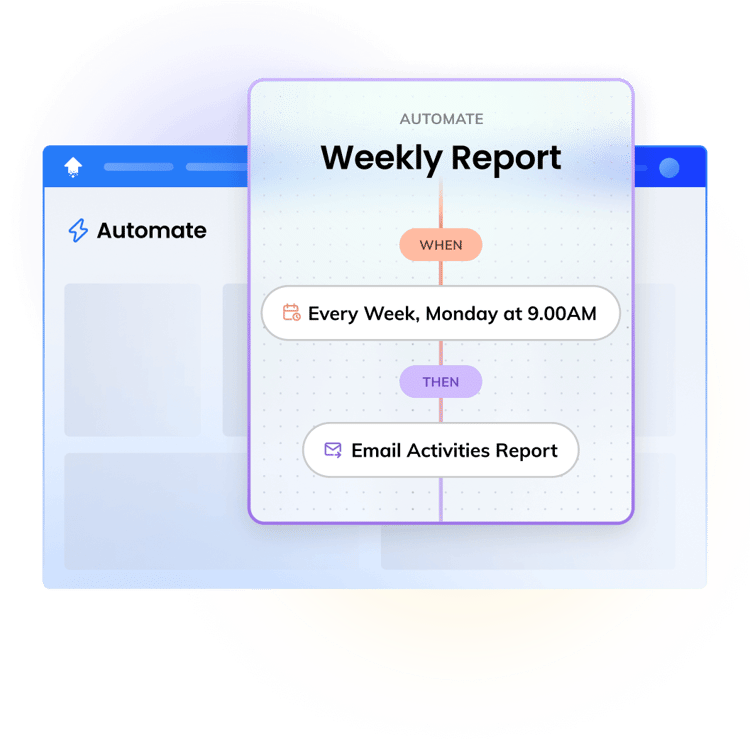
And just think about what you could do instead.
AI tools now deal with screening CVs, setting up the interview process, writing job descriptions, compiling the results of skills tests, and posting job ads on multiple boards.
Meanwhile the automation built into platforms like OneUp means they can collate and analyse data for you, and then deliver these reports straight to users’ inboxes.
So your recruiters can be getting on with more enjoyable and useful human-led tasks.
For example, they can be making more BD calls and really getting to know their connections, or spend longer finding more qualified candidates to delight their clients.
Meanwhile, you will have time to dive into the data to make informed, strategic business decisions, develop your employer brand, and focus on developing your team.
This should boost efficiency, productivity, and revenue for your agency — and it should also make it a happier place to work.
6. Find new ways to motivate your team
As every recruitment leader knows, effective motivation is instrumental for success.
And new tech means there’s a growing number of innovative ways to achieve improved motivation.
Recruitment gamification tools such as OneUp are a highly effective way to motivate your team.
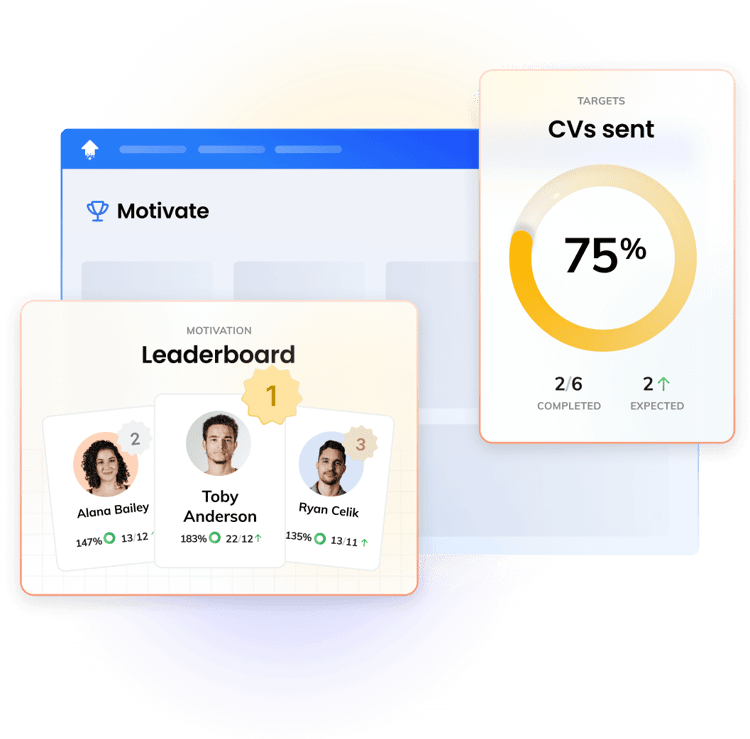
Gamification introduces established elements of gameplay such as points, badges, and celebrations into a recruiter’s day-to-day job, making it more engaging and enjoyable.
With OneUp, recruitment leaders can set team or individual targets and create custom dashboards to track progress towards these goals.
Engaging visualisations mean recruiters can see their performance at a glance — and track how near they are to hitting their next milestones.
Of course, gamification is especially effective when these milestones and targets are also linked to real-world incentives such as monetary bonuses.
Want to improve teamwork?
Create missions for your entire team in which they must work together to smash their targets.
You can also automate celebration anthems that will ring out around the office when a rep or team hits a milestone or goal.
Top tip — for optimal effectiveness, ensure your leaderboards are clearly displayed on prominent screens around your office.
Find more motivational recruitment consultant tips here.
7. Foster healthy competition between reps
The gamification approach is also incredibly useful when it comes to fostering healthy competition between recruiters.
As a recruitment leader, you’re always treading a fine line.
Too much competition, and some reps will become disheartened, feel undervalued, and ultimately disengage.
But too little competition and your productivity can become stale, resulting in lacklustre revenue.
Driving competition becomes much easier with recruitment gamification tools like OneUp in your arsenal.
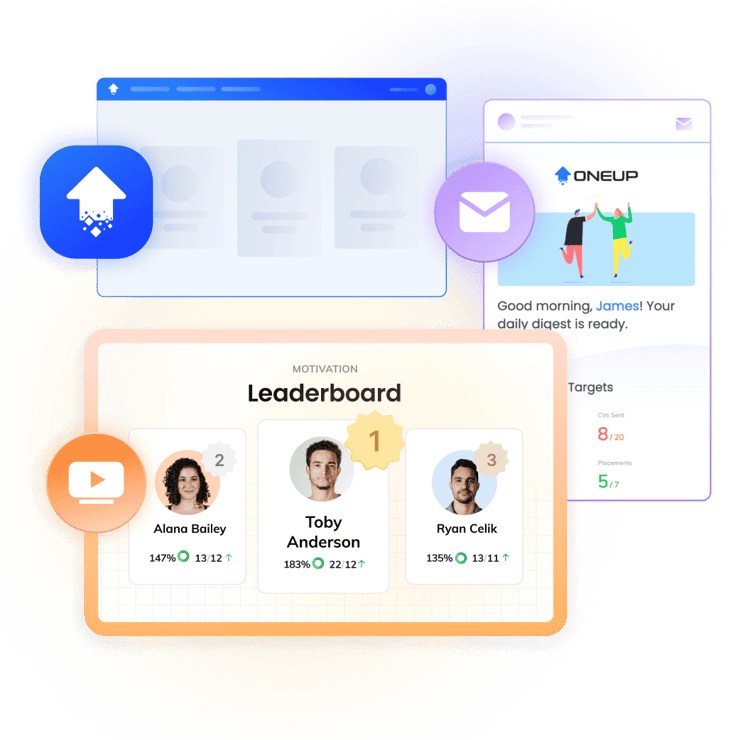
First up, you can set up leaderboards and leagues that clearly show reps their progress compared to their peers, and launch challenges between individuals or teams.
This will naturally drive competition between reps.
But if a team member is struggling — a new recruit perhaps — the agility of this tool means you can team them up with a more experienced, successful rep.
Not only will this result in an element of mentoring and upskilling for the new rep, but it will help to build their confidence and give them a taste for what winning feels like.
Baking competition into workflows will also help your team to generally approach tasks with a competitive mindset – triggering higher efficiency and production.
And, of course, all of this boosts the bottom line.
8. Encourage continuous team learning
With the pace of tech evolution seen today, recruitment teams cannot afford to become stale.
Even the most senior of recruitment leaders needs to commit to a continuous learning journey, or risk falling behind competitors.
But it can be hard to find the time.
Whether you’re an agency CEO or a brand new recruiter, your day is typically packed with urgent priorities that need to be tended to.
And often, despite the best of intentions, learning will slip to the bottom of the pile every day.
Yet continuous learning is actually more important for agency success than short-term firefighting tasks.
As a recruitment leader, it’s your responsibility to bake learning into the schedule.
Part of this is effective workload management.
If your team is chasing endless, unrealistic targets, or reps are handed a huge client load, it’s going to be near impossible for them to dedicate any time to learning.
Use one-to-ones to discuss the reality of your recruiters’ workloads.
Does any work need to be moved around the team?
Have you got to a point where a new hire is necessary?
Could automation be used to supplement and supercharge their efforts?
Next, look to block out time for learning.
Group learning sessions are the easiest and most engaging way to achieve this.
Most reps will learn more from interacting with a subject with their colleagues, than from simply reading articles online.
What’s more, leaders can then more easily track continuous learning progress as they will be aware who attended the session and how heavily they participated.
One useful technique is to give every recruiter a training session to run and ask them to talk about an interesting recruitment subject they have knowledge or experience of.
If a huge development occurs in the recruitment industry, you can take over a session yourself to get everyone up to speed — or even bring in an outside learning and development specialist.
But there’s more to continuous learning than just group training sessions.
Other useful techniques include:
- Mentoring and coaching schemes
- Sharing useful resources with the team
- Encouraging the sharing of interesting content
- Blocking out time for individual learning
- External qualifications
- Sending reps to conferences or webinars
9. Celebrate success
What motivates recruiters?
Monetary bonuses?
Absolutely.
But that pat on the back means more to them than you might imagine.
Imagine you’ve been striving for months to hit an important target. You’ve talked about it in one-to-ones and it's been brought up in team meetings. You’ve put in extra time and effort, perhaps even working long hours, to reach your goal.
Finally, the day comes and you’ve smashed your goal.
And then your manager doesn’t mention it.
Or if they do mention it, it’s just a brief, unenthused well done before they go about setting your next target.
This is always going to be a somewhat deflating experience — and not one that will motivate you to work just as hard towards your next goal.
So, make sure you have a system in place to recognise and reward those team members who are going above and beyond and smashing through their targets.
First up, there’s the initial celebration in the office as the real-time data shows them sailing past their target on your leaderboard or custom dashboard.
Alongside a public acknowledgement of their hard work at this point, tools like OneUp can be automated to play individualised celebration anthems at moments of success.
Then follow up.
This might look like:
- Passing on praise from senior leaders
- Wider public acknowledgement of their achievement
- Praising their performance in their one-to-one
- A team lunch, dinner or social event
- Handing out gift cards or entertainment tickets
- Establishing a ‘big billers club’ where high performers enjoy a lunch on the company each month
10. Upskill yourself as a manager
Let’s face it, a lot of recruiters don’t necessarily get great management training when they step up.
It makes sense that the top performers are promoted — but management is a very different skill to recruitment.
This means managers often need to upskill themselves in order to be an effective leader.
But as some of the busiest people in the office, they’re often just too time-poor to do so.
However, thanks to the evolution of automation, you can now free up some of that time to dedicate to improving your leadership — and subsequently your results.
There are many different ways for managers to upskill, including:
- External qualifications
- Management training courses
- Keeping up to date with the latest management news and research
- Mentoring and coaching schemes
- Asking for feedback from your team
- Attending lectures and webinars on management
Final Thoughts
In 2024, it’s essential that recruitment leaders have a robust tech stack to supercharge their agencies.
So much of recruitment success now comes down to having the right tech behind you, from boosting efficiency and productivity to making smart business decisions and motivating your team.
And when it comes to motivation, recruitment analytics software like OneUp are highly effective.
OneUp combines the power of real-time data and custom dashboards with intelligent automation to create a high-performance culture.




